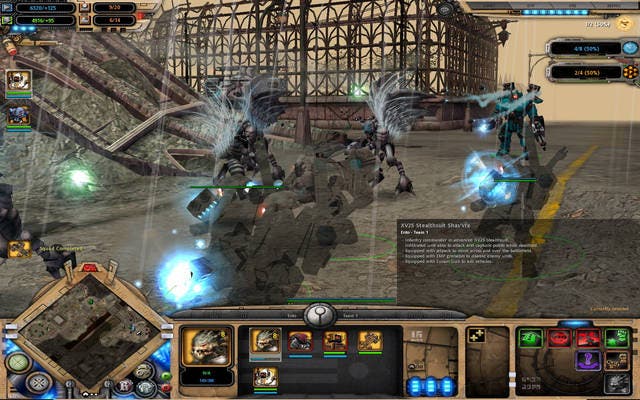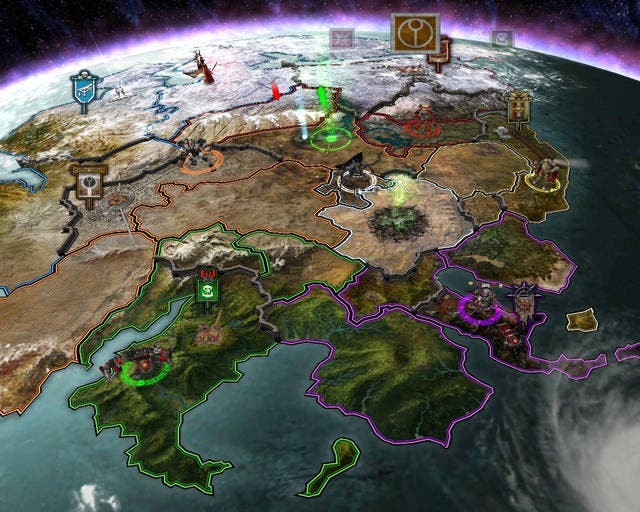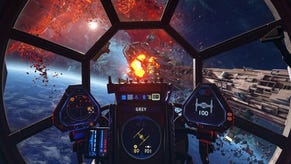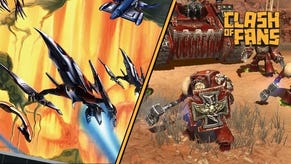Warhammer 40,000: Dawn of War - Dark Crusade
Not from the makers of Lucozade.
There's been some canny identification of what did and what didn't work in previous instalments of this sci-fi RTS. What did - robots. Big robots, small robots, fat robots, skinny robots, flying robots, robots with spinning drillbits for hands, robots with giant laser guns, steam-powered robots with teeth... What didn't - well, not a whole lot actually, but the Imperial Guard, the new race in Dawn of War's last expansion, were a little vanilla. Men and tanks may well be a staple part of a decent war, but honestly, they're just not as much fun as robots.
So, this time around, the two new playable races include an awful lot of robots. In fact, the new evil faction, the Necron, present a sort of beautiful wish-dream for the discerning science-fiction enthusiast: robots with zombies inside that look like the Terminator and live in a giant floating pyramid. It's reasonably hard to argue with that. The not-necessarily-good-but-morally-ambiguous-at-the-very-least Tau, meanwhile, take more of a Japanese mecha approach. Do robot suits count as being real robots? The question has yet to be resolved to my satisfaction, but hey, the Tau's mechs stomp, rend and deathray with the best of 'em.
Robot wars
Even without such spectacular scratching of robot fetishists' itch, first impressions of near-finished Dark Crusade code suggest it's much more complete a prospect than Dawn of War has ever previously been. While the original game looked amazing and offered the best multiplayer RTS kicks of the last couple of years, it wasn't quite as comfortable when wearing single-player trousers. First expansion Winter Assault included a much-improved solo campaign (with a tantalising glimpse of the wonderfully menacing Necron in its closing battle) and introduced the aforementioned Imperial Guard as an interestingly defensive (if largely robotless) race. Trouble is, Games Workshop's Warhammer 40,000 tabletop gaming universe is so rich with frenzied sci-fi invention and homage that every bite upon its delicious flesh only fills you with craving for another. Still more was needed.

Fortunately, Dark Crusade is quite the meal. The two new races add an awful lot - more on those later - but it's the complete overhaul of the single-player game that has the greatest effect. It's no longer the standard cut-scene/battle/cut-scene/battle with some new units formula, but rather hung around a strategy map similar to that of the Total War games. It's a battle for territory, each conquered zone granting resources and buffs to your forces, and thus being heavily contested. Rather than simply fighting a big old scuffle and only moving on to the next level when you eventually win it, you need to make decisions about whether to spend your resources on defensive contingents, in case the enemy makes a play for one of your territories, or on building up a hefty invasion force to make 'liberation' of other zones that much quicker. It's non-linear too, asking you to choose which territory you nobble next rather than forcing you to play out a particular strategy. If you make a bad choice, defeat in battle isn't necessarily the end of the game and a miserable tap upon the quickload key, but merely the loss of a possibly valuable area.
This approach is so much more satisfying than having to go through the usual RTS rigmarole of dribbling unit types out by increments. Dawn of War vets wouldn't have much enjoyed having to start over again with a handful of crap infantry, trudging through 10 levels or so before they get access to the big stuff. In the campaign mode, you can build anything you have the time and resources for. So, in a large zone with plenty of resource point locations, you'll probably conscript a massive force in order to best the enemy's similarly meaty ranks, but a small zone may be best conquered by a quickly made handful of soldiers and a smash'n'grab Blitzkrieg approach.
Particularly cementing the desire to play through the campaign rather than just play skirmish or multiplayer missions is the reward system. Perform certain feats, such as vanquishing the enemy to a frankly humiliating degree or collecting an unholy amount of resource points, and you'll win unlocks for your commander unit. Pick which one you want, and it'll up his (or her, if you're playing as the Eldar) abilities in some way. Each upgrade affects your fella's appearance, too. It's a very light touch of role-playing, but it's a fine way of helping you connect to the giant, death-dealing magic war machine you're pretending to be.
Zimmer army

Dark Crusade is equally pleasing for non-veterans. It's standalone rather than an expansion pack, and includes all five factions (butch Space Marines, ethereal Eldar, brutal Space Orks, monstrous Chaos and soldier-y Imperial Guard) from the previous two instalments alongside the new Necron and Tau. The only thing you're missing out on if you don't have the previous titles is their single-player storyline games, which are outdone massively by Dark Crusade's solo play anyway. You can play the new single-player campaign as any of the seven races, with a little bit of different cut-scene action for each to build the atmosphere. In other words, it's almost a sequel. There's even a new and much improved tutorial to ease you in gently, and introduce the differences the new races have over the more established factions.
It's these differences that mean the Necron and Tau are so much more than just another slew of skins, animations and made-up names. For instance, rather than being important to unit production, captured resource points increase the speed the Necron army advances at. Without any capture points, you can have the biggest army in the universe, but they'll creak agonisingly across the map like a retirement home's annual day out to Skegness Pier. The Tau's party trick, meanwhile, is offering two different tech trees, each with varying units and upgrades. You need to decide relatively early on whether offensive or defensive tactics will win the day, as once you pick one route, the other is closed off for the rest of the battle. The Tau also break up the robot deluge by conscripting some rather nasty reptilian and insectoid melee units to their otherwise laser-y forces.
Whether all this is enough to make a two-year-old game fresher than ever or if it's excessive icing on a now slightly stale cake we'll find out in a couple of weeks, when we review Dark Crusade, but right now it's looking very positive.





